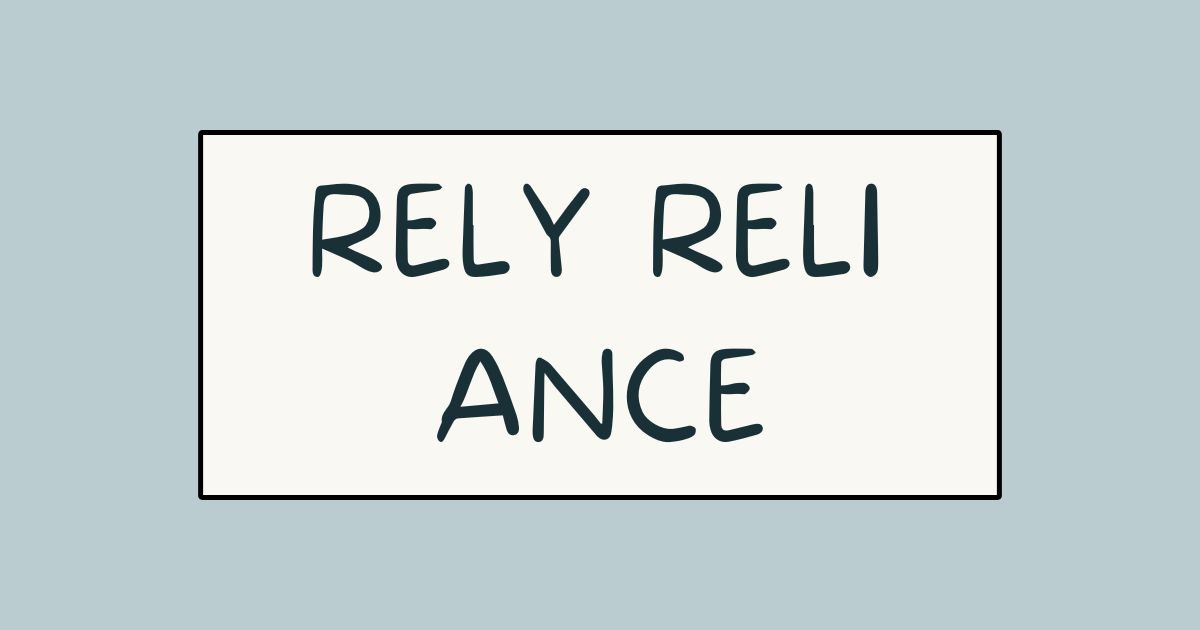The words rely and reliance are closely related in meaning but differ in grammatical function and usage. While both convey the idea of depending on someone or something, they are used in different contexts. Understanding how to use them correctly helps you communicate more effectively, whether you’re writing formally or speaking casually.
Definition of Rely
Rely is a verb. It means to depend on or trust someone or something to do what is needed or expected. When you rely on something, you believe it will support you, help you, or be there when needed.
Examples of Rely in Sentences
I rely on my alarm clock to wake me up every morning.
She relies on her friends for emotional support.
We rely on the internet for our daily work.
In each of these examples, the subject is depending on an object for a specific outcome or benefit.
Definition of Reliance
Reliance is a noun. It refers to the state or condition of relying on someone or something. It is often used when discussing the broader concept or level of dependence.
Examples of Reliance in Sentences
His heavy reliance on caffeine is concerning.
Our reliance on fossil fuels must decrease for a sustainable future.
The company’s reliance on one client made it financially vulnerable.
Here, the word reliance emphasizes the overall dependence rather than the act of depending.
Grammatical Roles of Rely and Reliance
The key difference lies in their grammatical use. Rely functions as a verb and often appears with prepositions like “on” or “upon.” On the other hand, reliance is a noun and is often followed by the preposition “on.”
Example:
Verb: Many people rely on public transportation.
Noun: There is a growing reliance on technology in classrooms.
When to Use Rely Instead of Reliance
Use rely when you want to describe the action of depending. It’s more suitable when you are explaining who is depending and what they are depending on, especially in everyday conversation or informal writing.
For example:
I rely on my team to meet the deadline.
You can rely on me to be there.
When to Use Reliance Instead of Rely
Use reliance when you’re discussing the concept of dependence itself. It’s more appropriate in formal writing, analysis, or when you want to focus on the idea rather than the action.
For example:
The article discussed the growing reliance on digital banking.
Reducing reliance on imports can boost the local economy.
Common Collocations with Rely
The verb rely often appears in phrases like:
Rely on someone
Rely heavily on
Rely entirely on
Rely upon (formal)
Common Collocations with Reliance
The noun reliance is typically used in phrases such as:
Heavy reliance on
Increasing reliance on
Total reliance on
Over-reliance on
Formal vs Informal Usage
Rely is more common in informal, spoken English and everyday writing, while reliance tends to appear in more formal contexts such as academic essays, business reports, or government publications.
Cultural and Practical Use Cases
In various industries and discussions, reliance may take center stage:
In environmental debates: “Our reliance on non-renewable energy is unsustainable.”
In economics: “Reliance on a single source of income is risky.”
In relationships: “Emotional reliance can lead to codependency.”
Rely is often used in everyday personal communication:
“Can I rely on you to pick me up?”
“We rely on our instincts more than we realize.”
Avoiding Common Mistakes
One frequent error is using reliance where rely is needed, or vice versa.
Incorrect: “He reliance on his teacher.”
Correct: “He relies on his teacher.”
Or: “His reliance on his teacher is evident.”
Just remember: rely is an action (verb), and reliance is a thing or idea (noun).
Synonyms and Related Words
For rely:
Depend
Count on
Trust
For reliance:
Dependence
Need
Trust
Confidence
These synonyms can help you vary your writing and deepen your understanding of the concepts.
Idioms and Phrases Using Rely or Reliance
“Don’t rely on luck”—means don’t expect luck to solve your problems.
“Over-reliance is dangerous”—means too much dependence can lead to problems.
Such expressions are useful in both conversation and written communication, especially when discussing planning, support systems, or trust.
How to Teach the Difference to ESL Learners
One effective method is to use substitution drills and sentence building exercises. For examp
Verb focus: “I ____ on my teacher.” (Answer: rely)
Noun focus: “My ____ on my teacher is strong.” (Answer: reliance)
These simple practices reinforce correct usage through repetition and structure.
Conclusion
In summary, rely and reliance are two sides of the same coin—one is an action, and the other is a condition. Mastering when and how to use these words enhances clarity and depth in your communication. Whether you’re writing an essay, crafting a speech, or having a chat, choosing the right form helps your message land effectively. Practice them in context, and soon the difference will come naturally.
FAQs
Can I use “rely” without “on”?
Generally, no. “Rely” is typically followed by “on” or “upon” to complete the meaning.
Is “reliance” a negative word?
Not inherently. It can be neutral, positive, or negative depending on context.
What is the plural of reliance?
“Reliances” exists but is rarely used. The concept is usually treated as uncountable.
Are “depend” and “rely” the same?
They are similar but “rely” can imply a deeper sense of trust or consistency.
Can “reliance” be used in casual conversation?
Yes, though “rely” is more common in casual speech. “Reliance” tends to sound more formal.















